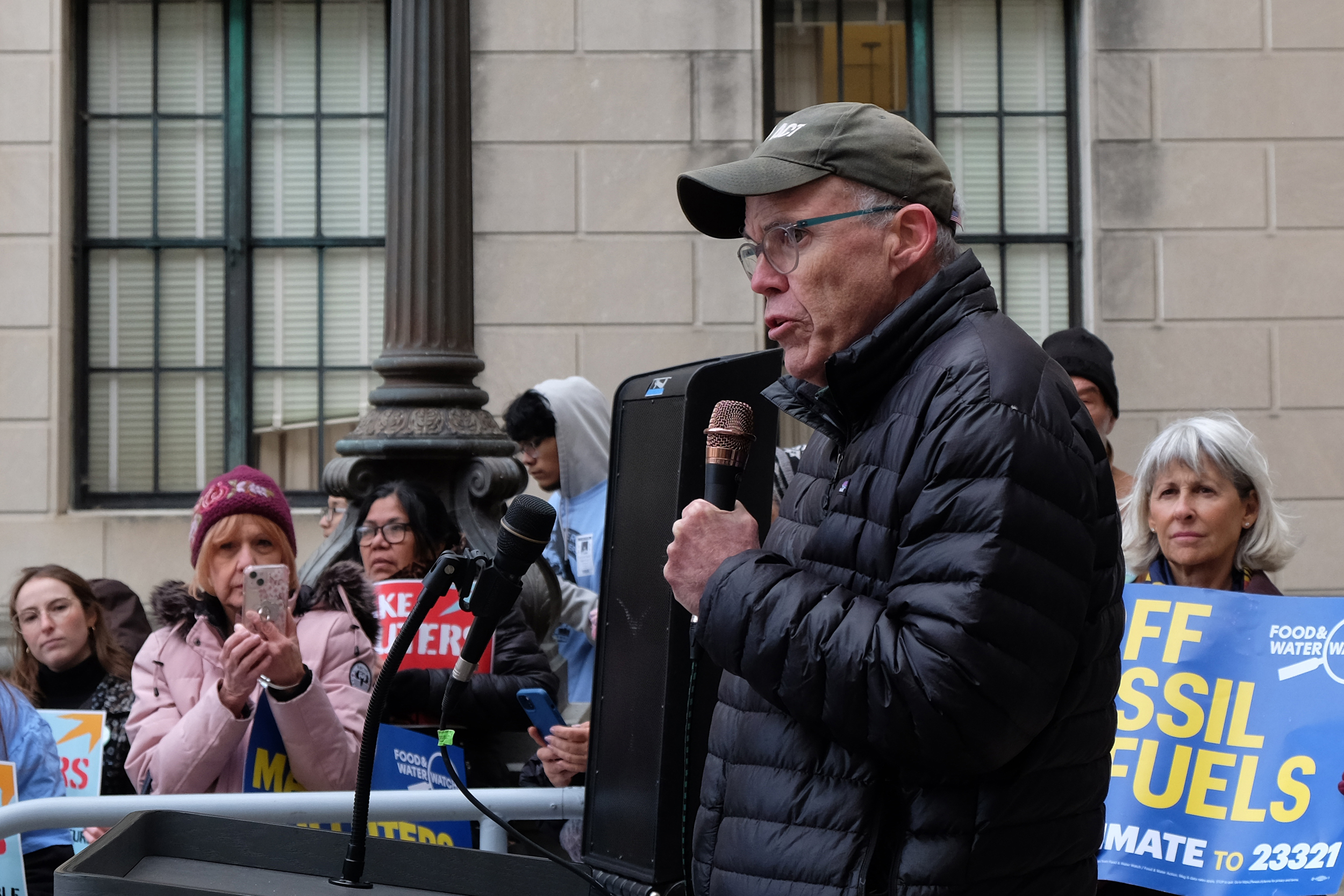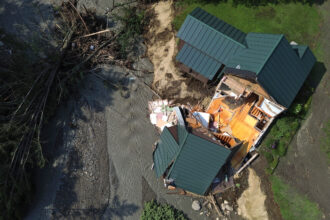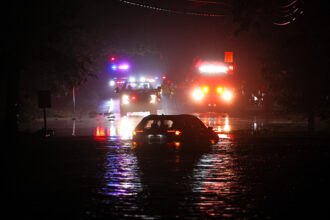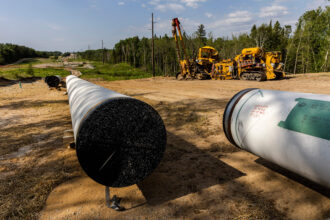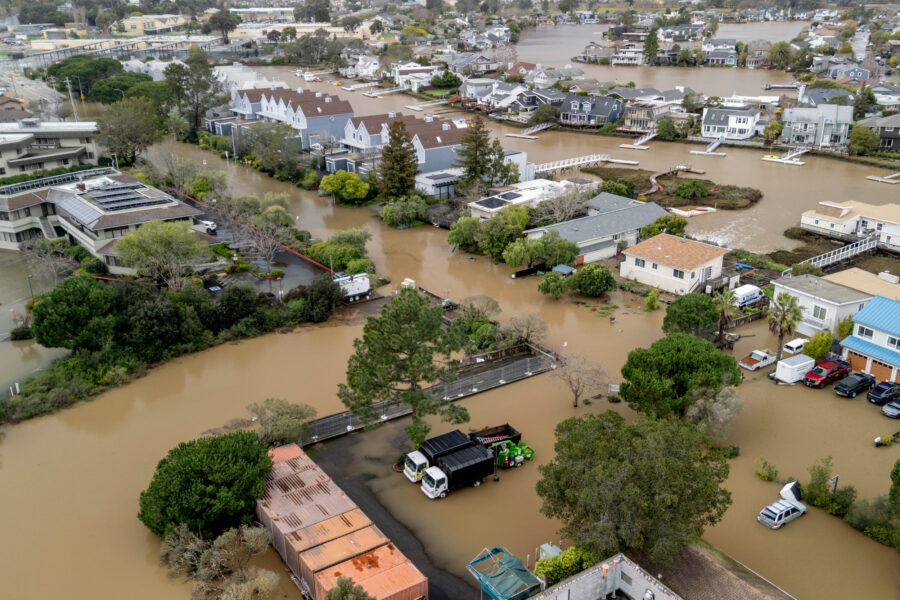TRENTON, N.J.—On Monday, more than 100 young and old activists, faith leaders and politicians gathered outside of the New Jersey State House beneath a large balloon with the bold yellow words: “Make Polluters Pay!” The crowd was there to urge lawmakers to pass a new bill that would charge fossil fuel companies a fee for the historic harms their pollution has caused New Jersey residents.
If passed, the Climate Superfund Act with its potential to generate an estimated $50 billion over 20 years, could significantly bolster state disaster relief and climate resilience projects. The bill has drawn strong opposition from the fossil fuel industry, but New Jerseyans are mounting their efforts to bring it to a vote before the legislative session ends on Jan. 13.
Renowned climate activist Bill McKibben, the founder of 350.org, spoke at the rally. McKibben was a major mover behind Vermont’s 2023 Climate Superfund Act, the first law of its kind to pass in the United States. He helped usher in New York’s Superfund Act the following year. Both have prompted lawsuits by the Trump administration, which argues that they violate the federal Clean Air Act and the Commerce Clause of the U.S. Constitution.
Like McKibben’s home state of Vermont, New Jersey faces catastrophic flooding and sea level rise, along with severe storms amplified by climate change. Energy customers in the Garden State pay some of the highest bills in the country. “Our communities pay with our pockets, or pay with our lives,” said Viri Martinez, with Alliance for Immigrant Justice, at Monday’s rally.
The bill would hold big oil companies, such as Exxon and Shell, that have emitted more than one billion tons of greenhouse gases since 1995, responsible for the planet-warming pollution from drilling and burning oil and gas, which traps heat in the atmosphere and leads to more intense rainfall, heatwaves and storms. More than 50 percent of these funds would be allocated to overburdened communities.
“We know whose fault it is, whose responsibility it is, who needs to pay for it,” McKibben said to the crowd. “It is time to hit [oil companies] where it counts for them, and that is by sending them a big fat bill to reflect exactly the damage that they’ve been doing.”
Neither Exxon nor Shell responded to a request for comment.
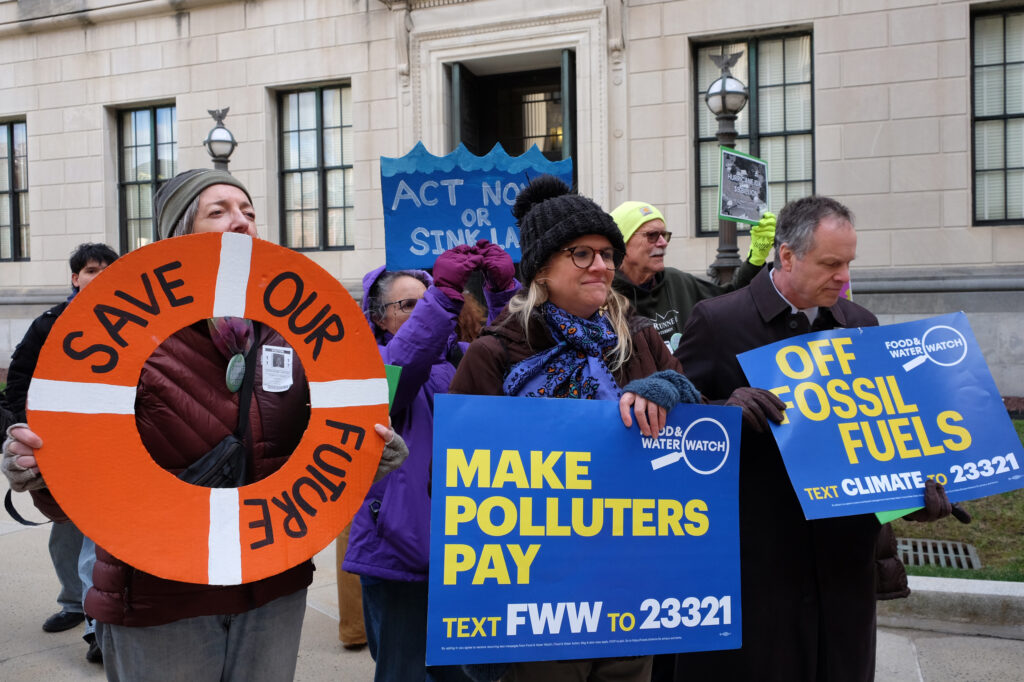
Before he went in front of the state house to speak, McKibben talked with Inside Climate News about why he thinks passing the Climate Superfund Act is so important and how it could set the stage for more state action on climate change. This interview has been edited for length and clarity.
CARRIE KLEIN: Can you tell me about why you’re out here in New Jersey today to support the Climate Superfund Act?
BILL MCKIBBEN: This is a great idea anywhere in the country. We’ve passed it in Vermont and New York. But New Jersey is where big oil began. Standard Oil of New Jersey was the beginning of what became Esso and then Exxon. This would be an important symbolic statement, as well as a very practical one.
We’re also are at this moment when we’re talking about affordability all the time. This should be the easiest vote that any legislator ever makes. Who do you want to send the bill for repairing bridges and culverts and roads to, your taxpayers, or Exxon headquarters in Houston? If I’m a state legislator, that’s the easiest vote of the year. It doesn’t cost you anything—it makes money.
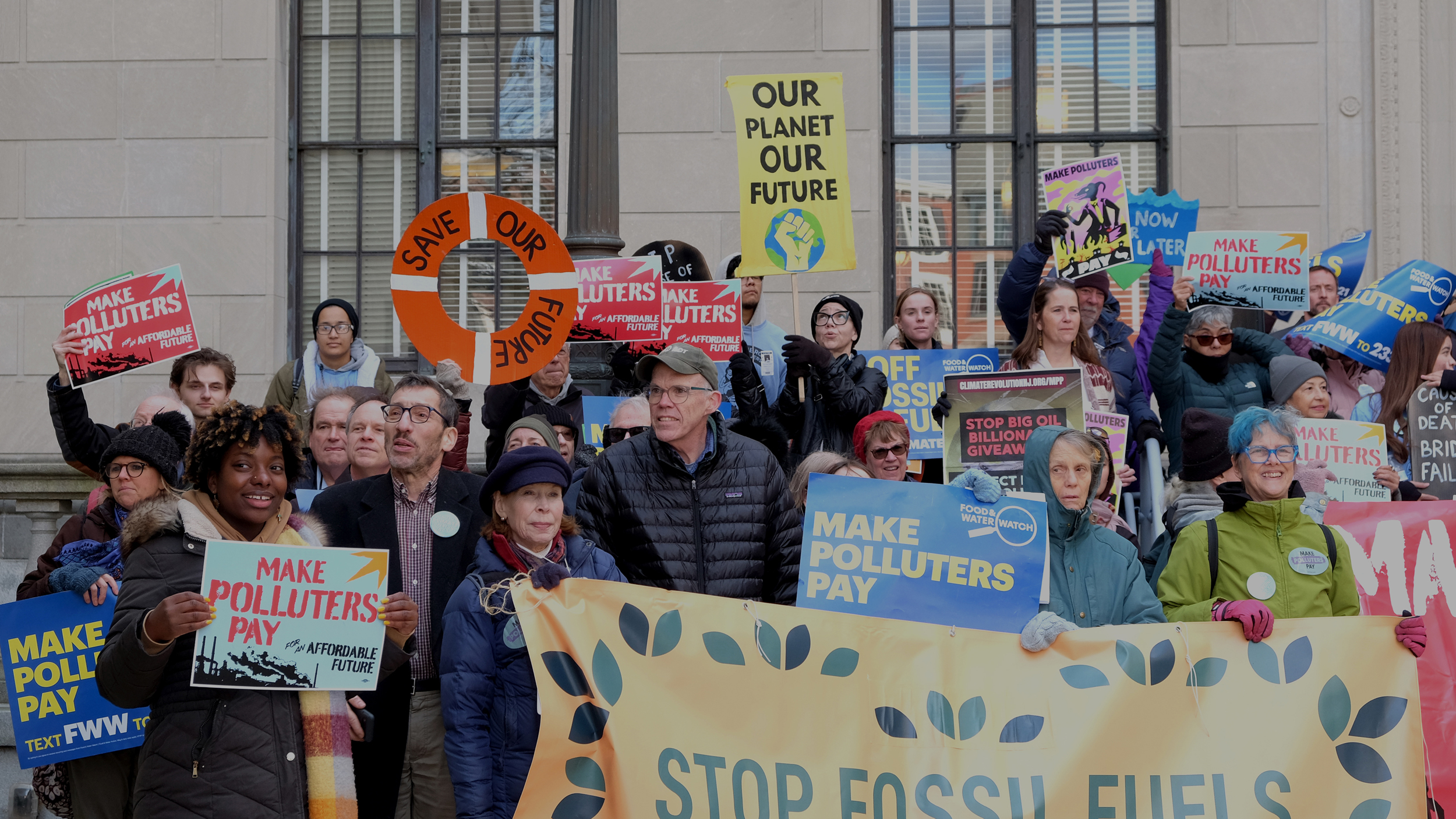
KLEIN: The bill has garnered grassroots support, but it’s still not clear whether the legislature will call this to a vote. What do you think it would take to get more lawmakers on board?
MCKIBBEN: Well, this [rally] will help. If you don’t get out and organize, then status quo and vested interest always win. Every single day of the year, the paid lobbyists are hard at work inside these halls and the halls of every other legislature. If nobody stands up to them, then they win. But when we organize on this stuff, we often triumph. So I anticipate we will here.
This story is funded by readers like you.
Our nonprofit newsroom provides award-winning climate coverage free of charge and advertising. We rely on donations from readers like you to keep going. Please donate now to support our work.
Donate NowKLEIN: What would you say to people who might be concerned that this bill could end up raising energy costs?
MCKIBBEN: There’s no way that it can raise energy costs. The price of oil isn’t set state by state. We buy oil on a global market. So there’s no possible way that this will raise the price of oil. If anything, just the opposite: Breaking the political power of the fossil fuel industry eventually will lower the price.
But we also have a sense of the kind of moral stakes here, in large part thanks to Inside Climate News, which, in 2015, explained to us exactly how much the oil industry knew about climate change back in the day. It’s not that we shouldn’t just be sending these guys a bill. We should be putting them out of business. They’ve acted badly for a long time.
KLEIN: The Climate Superfund Act could potentially generate $50 billion over 20 years for climate relief in New Jersey. Can you explain why that money’s so important?
MCKIBBEN: If you’re a Department of Public Works superintendent in some New Jersey town, you’ve spent the last 10 years taking out 14-inch culverts and putting in 18-inch culverts because the old book doesn’t work anymore. We now get rainstorms larger than we’ve ever seen before. So when the breach washes out when it floods, someone has to pay for that: either your taxpayers or the guys who made huge amounts of money off raising the temperature of the Earth. Those are the two choices.
KLEIN: If New Jersey does pass this, what kind of message do you think that would send to other states and to the country, especially in the face of mounting federal rollbacks to climate protections?
MCKIBBEN: I think the message it sends is there’s beginning to be a big block of states that are not willing to foot this tab forever. I think it sends, among other things, a strong message off to California to do the same thing. New York was a very key event last year, and so it’s very good to see the same thing happening here in the Garden State.
We’re not getting anything done in Washington for the next year, so we need to do everything we can at the state and local level.
About This Story
Perhaps you noticed: This story, like all the news we publish, is free to read. That’s because Inside Climate News is a 501c3 nonprofit organization. We do not charge a subscription fee, lock our news behind a paywall, or clutter our website with ads. We make our news on climate and the environment freely available to you and anyone who wants it.
That’s not all. We also share our news for free with scores of other media organizations around the country. Many of them can’t afford to do environmental journalism of their own. We’ve built bureaus from coast to coast to report local stories, collaborate with local newsrooms and co-publish articles so that this vital work is shared as widely as possible.
Two of us launched ICN in 2007. Six years later we earned a Pulitzer Prize for National Reporting, and now we run the oldest and largest dedicated climate newsroom in the nation. We tell the story in all its complexity. We hold polluters accountable. We expose environmental injustice. We debunk misinformation. We scrutinize solutions and inspire action.
Donations from readers like you fund every aspect of what we do. If you don’t already, will you support our ongoing work, our reporting on the biggest crisis facing our planet, and help us reach even more readers in more places?
Please take a moment to make a tax-deductible donation. Every one of them makes a difference.
Thank you,


